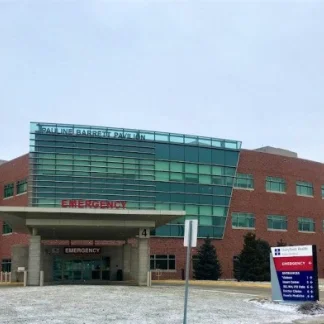Covenant Medical Center Horizons - Family Centered Recovery
Covenant Medical Center Horizons – Family Centered Recovery is a private rehab l...
UnityPoint Health - Allen Hospital EAP is an outpatient rehab located in Waterloo , IA. UnityPoint Health - Allen Hospital EAP specializes in the treatment of substance abuse and mental health problems.
Contact us for more information: (319) 235-3550

Connect with UnityPoint Health - Allen Hospital EAP by calling their admissions team directly.
(319) 235-3550 Website Get DirectionsResearch clearly demonstrates that recovery is far more successful and sustainable when loved ones like family members participate in rehab and substance abuse treatment. Genetic factors may be at play when it comes to drug and alcohol addiction, as well as mental health issues. Family dynamics often play a critical role in addiction triggers, and if properly educated, family members can be a strong source of support when it comes to rehabilitation.
Group therapy is any therapeutic work that happens in a group (not one-on-one). There are a number of different group therapy modalities, including support groups, experiential therapy, psycho-education, and more. Group therapy involves treatment as well as processing interaction between group members.
In individual therapy, a patient meets one-on-one with a trained psychologist or counselor. Therapy is a pivotal part of effective substance abuse treatment, as it often covers root causes of addiction, including challenges faced by the patient in their social, family, and work/school life.
Group therapy is any therapeutic work that happens in a group (not one-on-one). There are a number of different group therapy modalities, including support groups, experiential therapy, psycho-education, and more. Group therapy involves treatment as well as processing interaction between group members.
In individual therapy, a patient meets one-on-one with a trained psychologist or counselor. Therapy is a pivotal part of effective substance abuse treatment, as it often covers root causes of addiction, including challenges faced by the patient in their social, family, and work/school life.
In individual therapy, a patient meets one-on-one with a trained psychologist or counselor. Therapy is a pivotal part of effective substance abuse treatment, as it often covers root causes of addiction, including challenges faced by the patient in their social, family, and work/school life.
Covenant Medical Center Horizons – Family Centered Recovery is a private rehab l...
MercyOne Horizons is a drug and alcohol rehab and medical facility located in Wa...
Quakerdale of Waterloo is a private rehab located in Waterloo, Iowa. Quakerdale ...
Hope Haven – Waterloo is a private rehab located in Waterloo, Iowa. Hope Haven –...